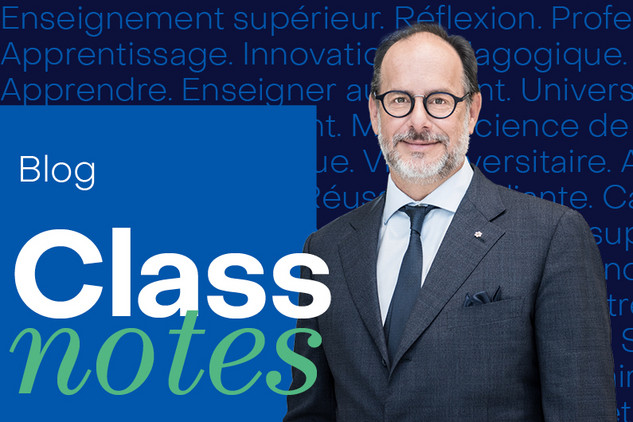It’s already February. January was unusually mild, and the holiday season a bit grey, but I hope that in those those few fleeting days you had off you were able to enjoy yourself with family and friends. Now more than ever, getting together and spending time with those you care about is something very precious. Especially in the middle of a power blackout.
While Mariah Carey’s classic Christmas album plays on repeat in my home, I always have a kind thought for those who devote a good part of the holiday to the sometimes-thankless task of grading exams, papers, essays, and other written assignments for their courses. Let’s face it: it’s a tedious exercise. I’m not teaching now, but I have a somewhat bleak memory of hours spent reading, commenting on, and marking dozens of exam booklets or a pile of term papers. Perhaps it's the price one pays for the extraordinary career and experiences that academic life offers. Marking is time-consuming, repetitive, and usually disappointing.
Time-consuming, repetitive, disappointing. There’s food for thought here. Marking is time-consuming but there aren’t many ways to reduce the time it takes to assess students’ work—at least not when you want to do it in a way that is serious and useful for each student, including giving them feedback. So why was I often disappointed with the quality of the papers and exams submitted to me? My students were brilliant, the cream of the crop. My courses were well-designed and well-delivered, at least from my rather subjective point of view. I should have been able to count, statistically speaking, on a high proportion of very satisfactory exam papers and at least a few impressive and inspiring gems. In any case, I should have completed the task of marking with a sense of accomplishment: yet another cohort well-informed about the major issues and the ins and outs of the subject I was teaching. But no, too often I had the feeling that the profound significance (!) of my message had not been heard. Many other colleagues experienced the same disappointment.
A mystery? No. Part of the explanation lies in poor management of expectations. It’s a bit like those famous “wish lists” that people make for gift-giving. Between the optimists who leave room for creativity with “Surprise me!” and the control freaks who ask for “a pair of brown leather gloves, size XL, made by Bugatti, that I had put aside at the leather goods counter at Simon’s,” there’s a whole range of strategies and a vast potential for disappointment.
In other words, to avoid disappointment with student performance, it seems to me that we need to formulate clear expectations, aligned with specific learning objectives, and test how much the students comprehend material that, on the one hand, has merely been touched upon in the course, and, on the other, that which we've covered in depth. In this regard, I’ve been wrong more than once. Asking a question on a topic that has never been discussed in class, hoping that the best students, relying on what they’ve learned, will figure it out and do well, is not a good solution. Asking students, during an exam, to do an exercise that they haven’t been able to try in a learning context, predictably produces disappointing results. Deliberately preparing an exam that’s too long for the allotted time (which favours the quicker but not necessarily the better performers), is also a bad idea.
Another factor might explain, in part, why professors are often disappointed with the answers they get in exams or term papers. It’s the feeling that we’re reading the same thing over and over again, sometimes in the same words—perhaps taken from standardized course notes, which are now readily available. This is especially true if the same exam questions are repeated year after year.
Students are naturally, and with reason, risk-averse. When you have an eye on your grade point average, it’s more reassuring to repeat commonplaces, to stick to tried and tested ideas, or even to regurgitate what’s been taught, than to think outside the box, to be creative and original, or to take the opposite view to the dominant theories. This is less true for oral exams, which I’ve experienced on a few occasions and where differing views can be expressed more clearly. But in writing, many students have good reasons for not going beyond what’s “obvious at first glance,” even if they have the potential to go much further. Yet I’ve never been more proud of my students than when I've freed up their inner voice, when I've spurred them to take ownership of the material and express it in their own words. This only works if exploration is explicitly encouraged and good results implied, and students are given the chance to stretch throughout the term. At exam time, it’s too late. Few will dare to do it then.
In short, to relieve the tedium of marking papers and exams and to give your students a real chance to demonstrate their mastery of the material, you have to clearly state your expectations and let them exercise their creativity. Put yourself somewhere between “Surprise me!” and “I prefer a Starbucks gift card.” Give yourself time now to think about it, even though the end of term is still far off, because evaluation should be thought of as an intrinsic part of the course, rather than the end result.
Daniel Jutras
If you’d like to continue the conversation, please drop me a line.
